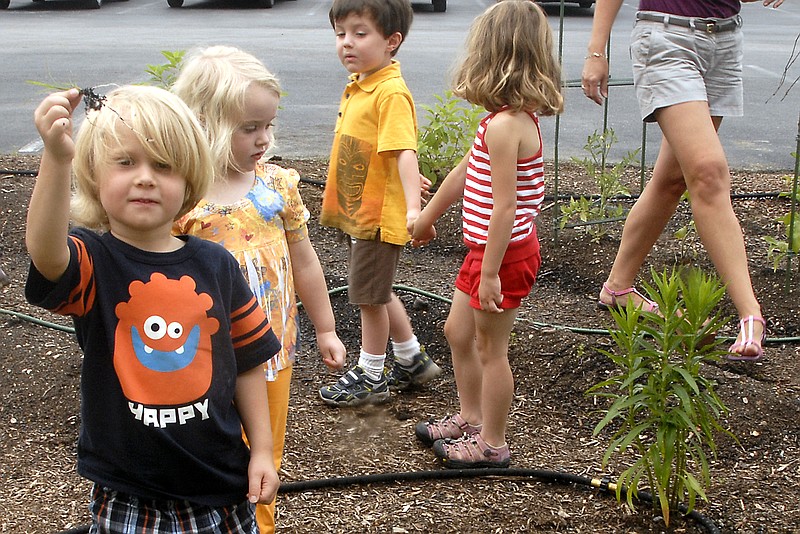In groups of six, the 3- to 5-year-olds of the Montessori School eagerly pull weeds out of the garden, their small hands studiously tipping tin watering cans, pouring half their contents on the plants while the other half splashes in the dirt.
The children spend at least two to three hours a week planting, watering and maintaining the school's new sensory garden as part of their education.
"A Montessori basic concept is that (children) always need hands-on experiences and real things to work with," said Peg Everts, director of facilities for the school. The garden is just one more way to do that, she said.
Last year, the school received a $1,000 grant from the Hamilton County Eat Smart Healthy Starts program, which spurred the idea of what now has become an almost-8,300-square-foot garden behind the Montessori building near Warner Park.
SENSORY GARDEN* 8,296 square feet* Will include a Zen garden and a greenhouse* Children between the ages of 1 and 14 will learn how to plant, grow, harvest, taste, cook and experience nature.* Funded with a $1,000 grant from the Hamilton County Eat Smart Healthy Starts program, Montessori School budget and the Parent-Teacher CouncilSource: Montessori School
"We were trying to green the school, make more of a green environment here," said Bobbe Spink, head of the school. "We believe that small children particularly learn through their senses, so it was a natural fit for us at Montessori School to develop a garden that would stimulate the senses."
The idea, she said, is for children to learn using the outdoor environment.
"It's important for us that, when our toddlers study about sunflowers, they are able to go and cut their sunflower, remove the seeds, use some for the bird feeder, taste some," said Mrs. Spink, "and the same if they are learning about other vegetables."
For Matthew Good, who has volunteered at the garden with his wife Kelly, showing children where their food grows is an essential part of their education.
"It's a good, well-rounded education. They'll be learning their reading and writing and arithmetic, but also learning about plants, food and where it comes from," he said.
"Being involved with it, hopefully they'll see that's an important part of life on the planet and taking care of it (and) hopefully that will translate into greater things," said the father of 5-year-old Lucy and 3-year-old Charlie, both students at the school.
The garden now is in phase one, school officials said, but the finished product will include a green house, a Zen garden -- also called a Japanese rock garden -- with movable rocks, peach trees and a water pond that will generate electricity.
And whatever produce is not used for the students' tasting and cooking classes will go to the Salvation Army.
"We knew that having 240 children gardening, you are going to have way more food than you can use," Mrs. Spink said. "We want them to learn to garden, to see the cycle of the plant, but at the same time, as we talked, we realized we were going to have a surplus and what better way to teach them to give to others?"
Mr. Good will help them build two composting areas this summer so the children can start learning about making their own compost, as well, he said.
Continue reading by following this link to a related story:

